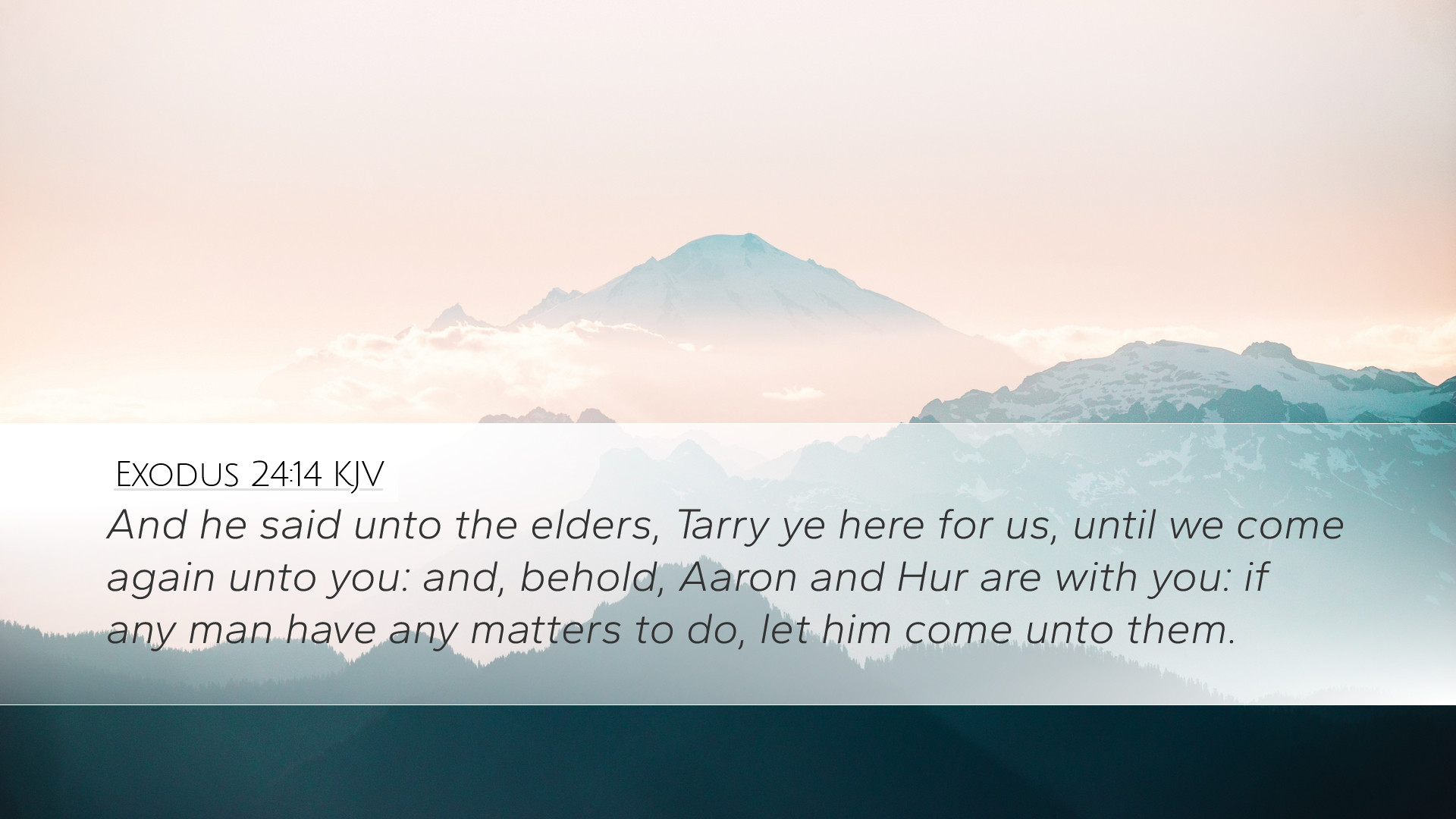Exodus 24:14 Commentary
Exodus 24:14 states:
“And he said unto the elders, Tarry ye here for us, until we come again unto you: and, behold, Aaron and Hur are with you: if any man have any matters to do, let him come unto them.”
This verse comes at a pivotal moment in the narrative of the Israelite Exodus, particularly during Moses' ascent to Mount Sinai to receive the Law from God. It reflects both leadership and delegation as key themes in the governance of Israel.
Contextual Background
In the context of Exodus, the preceding chapters detail God’s covenant with Israel and the establishment of the Law. This particular verse occurs after the covenant has been ratified by the people, underlining the importance of order and organization within the newly formed nation.
Matthew Henry's Insights
Henry comments on the significance of Moses leaving Aaron and Hur in charge, emphasizing the importance of delegation in leadership:
- Leadership and Trust: Moses demonstrates trust in Aaron and Hur, who are not merely assistants but responsible leaders in their own right.
- Authority and Responsibility: Henry points out that Moses is implying that authority does not cease in his absence; he delegates responsibilities that are vital for community stability.
- Encouragement for the People: By instructing the elders to await their return and presenting Aaron and Hur as support, Moses instills confidence in the leadership and underscores continuity in governance.
Albert Barnes' Reflections
Barnes provides a profound insight into the implications of this verse regarding communal decision-making:
- Community Involvement: He underscores the importance of a collective approach even in leadership, as Moses involves the elders in the decision-making process."
- Delegation: Barnes emphasizes that the act of leaving Aaron and Hur in charge showcases the paramount importance of wise and responsible governance among the leaders of Israel.
- Pastoral Responsibility: The mention of settling matters suggests a proto-judicial role for these leaders, which precedes the later formalization of judicial systems in Israel. This speaks to the pastoral role of leaders in providing guidance and resolving disputes.
Adam Clarke's Commentary
Clarke focuses on the practical implications of the verse for leadership models in the church and community:
- Role of Elders: Clarke notes that the presence of elders indicates the community’s need for godly leaders who can manage affairs rightly in the absence of a primary leader.
- Expectation of Return: The phrase “until we come again” imbues the mission with an expectation of eventual return, symbolizing hope and continuity of spiritual guidance in the community.
- Preparedness:** Clarke stresses that Aaron and Hur were prepared for their roles, suggesting the need for leaders to be equipped spiritually and practically to handle the responsibilities assigned to them.
Theological Implications
This verse serves not merely as a historical account but as a theological framework for understanding authority, community, and governance:
- Divine Order: The appointment of Aaron and Hur illustrates a model of divine order over chaos, emphasizing that God is a God of structure and intention.
- Stewardship of Leadership: The delegation by Moses illustrates a biblical principle of stewardship; leaders are entrusted with responsibilities that must be managed faithfully.
- Prefiguration of Church Governance: Moses’ approach delineates a framework for church governance, where leaders must be appointed and be accountable for guiding the community.
Application for Modern Context
For contemporary pastors, theologians, and church leaders, Exodus 24:14 carries several practical applications:
- Empowerment of Lay Leaders: Leaders are encouraged to empower and delegate tasks to capable lay leaders, fostering a culture of shared responsibility.
- Building Trust in Leadership: The relationship between leaders and followers should be characterized by trust and support, ensuring that the community feels secure in the leadership they embrace.
- Encouraging Collective Decision-Making: Leaders should cultivate an environment where collective decision-making is valued, reflecting the collaborative governance seen in Exodus.
- Preparation for Challenges: Just as Moses prepares for challenges ahead, modern leaders must equip themselves and their teams to handle disputes and challenges effectively.
Conclusion
Exodus 24:14 encapsulates the essence of effective leadership through trust, delegation, and community involvement. The insights from the commentaries of Matthew Henry, Albert Barnes, and Adam Clarke provide a multi-faceted understanding of the responsibilities of leaders in a faith community. This verse stands as a significant reminder of the ideals of governance rooted in accountability, preparation, and divine order within the context of God's covenant people.


